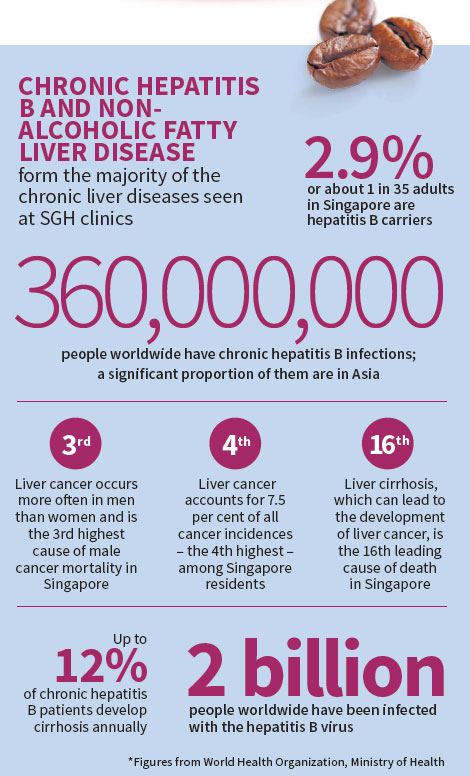Coffee, not caffeine, reduces mortality risk of liver cirrhosis. The Department of Gastroenterology and Hepatology at Singapore General Hospital explains why.
The jury may still be out on whether coffee is good or bad for health. But a new study has given the beverage a thumbs-up – at least for the benefits it has for some liver diseases.
The study by
Singapore General Hospital (SGH) and
Duke-NUS Graduate Medical School doctors found that drinking at least two cups of coffee a day lowered the risk of dying from non-viral hepatitis-related cirrhosis among Chinese in Singapore by 66 per cent. Cirrhosis is scarring of the liver and can be due to viral hepatitis B or C, or non-viral causes such as heavy drinking, autoimmune disease and fatty liver disease.
According to
Dr George Goh, Consultant,
Department of Gastroenterology and Hepatology,
Singapore General Hospital (SGH), a member of the
SingHealth group, the benefits of coffee reported in earlier international studies on several aspects of liver disease have been inconsistent. But the SGH-Duke-NUS study was able to show for the first time “that it is the non-viral hepatitis cirrhosis group, rather than the viral hepatitis group, that benefits from drinking coffee,” Dr Goh said.
“Coffee did not affect mortality from viral hepatitis-related cirrhosis, but drinking two or more cups of coffee per day reduced mortality from non-viral hepatitis-related cirrhosis by 66 per cent.”
Coffee, not caffeine, reduces mortality risk of liver cirrhosis
Coffee has more than a thousand compounds, and it is difficult to identify the actual active component that reduces the risk of dying from cirrhosis, said Dr Goh, one of the investigators of the study. “From our data, we know that it is not caffeine, which is one of the more prominent compounds that come to mind when talking about coffee. We postulate that several of its other compounds such as polyphenols, melanoidins, cafestol and kahweol have antioxidant and anti-inflammatory properties that are beneficial for the liver.”
The study found that other caffeine- containing beverages like green tea and black tea had no significant effects on cirrhosis mortality. Drinking fruit juices or soft drinks also didn’t affect the risk of dying from cirrhosis. Another finding of the study, unsurprisingly, was that respondents who drank at least 20g of ethanol (alcohol) every day had a greater risk of dying from cirrhosis than non-drinkers.
Cultural considerations
The study was based on data from an earlier research study cohort by
Associate Professor Koh Woon Puay of
Duke-NUS Graduate Medical School. Together with
Associate Professor Chow Wan Cheng, Senior Consultant, Department of Gastroenterology and Hepatology, SGH, the investigators then collaborated by identifying the cases and conducting the analysis together, said Prof Koh.
The finding from their study, said Prof Koh, “resolves the seemingly conflicting results on the effect of coffee in Western and Asian-based studies of death from liver cirrhosis. Our finding suggests that while the benefit of coffee may be less apparent in the Asian population where chronic viral hepatitis B predominates currently, this may change as the incidence of non-viral hepatitis-related cirrhosis is expected to increase in these regions, accompanying the increasing affluence and westernised lifestyles of their younger populations.”
Coffee is widely consumed globally and is universally accepted as a lifestyle choice, rather than a “pharmacological drug”, said Dr Goh. Hence, it has worldwide appeal in its use as a therapeutic option in liver disease, particularly in chronic liver diseases such as non-alcoholic fatty liver disease where treatment options are limited.
“However, there remains a lot more research that is required before we can confidently ‘prescribe’ coffee as a treatment option,” he said.
The study was published in February in Hepatology, the international publication for original, peer-reviewed articles concerning all aspects of liver structure, function and disease, and was presented orally in the Outstanding Clinical Research Award category of the SGH 20th Annual Scientific Meeting.
Study recruited older Chinese living in Singapore
The data of 63,275 ethnic Chinese living in Singapore were used for the coffee reduces risk of mortality from nonviral hepatitis-related cirrhosis among Chinese in Singapore study to find out if drinking coffee, alcohol, black tea, green tea and soft drinks affected the risk of dying from cirrhosis.
The subjects, between 45 and 74 years of age, were surveyed for an earlier study, and had provided information on their diets, lifestyle choices, and medical histories during in-person interviews conducted between 1993 and 1998.
They were followed for an average of nearly 15 years, during which 14,928 or 24 per cent died at the average age of 67. Of this number, 114 died of liver cirrhosis.

Ref: R14
